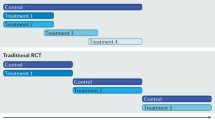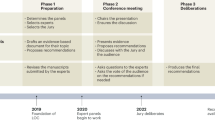Abstract
Surgery remains a mainstay in the treatment of most solid cancers. Surgeons have always engaged in various forms of high-quality cancer research to optimize outcomes for their patients, for example, contributing to clinical research and outcomes research as well as health education and public health policy. Over the past decade, however, concerns have been raised about a global decline in the number of surgeons performing basic science research alongside clinical activity — so-called surgeon scientists. Herein, we describe some of the unique obstacles faced by contemporary trainee and practising surgeons engaged in research, as well as providing a perspective on the implications of the diminishing prominence of the surgeon scientist. Finally, we offer some thoughts on potential strategies and future directions for surgical engagement in oncology research to increase the number of research-active surgeons.
This is a preview of subscription content, access via your institution
Access options
Access Nature and 54 other Nature Portfolio journals
Get Nature+, our best-value online-access subscription
$29.99 / 30 days
cancel any time
Subscribe to this journal
Receive 12 print issues and online access
$209.00 per year
only $17.42 per issue
Buy this article
- Purchase on Springer Link
- Instant access to full article PDF
Prices may be subject to local taxes which are calculated during checkout

Similar content being viewed by others
References
Ferlay, J. et al. Cancer incidence and mortality worldwide: sources, methods and major patterns in GLOBOCAN 2012. Int. J. Cancer 136, 359–368 (2014).
Miller, K. D. et al. Cancer treatment and survivorship statistics, 2016. CA Cancer J. Clin. 66, 271–289 (2016).
Sullivan, R. et al. Global cancer surgery: delivering safe, affordable, and timely cancer surgery. Lancet Oncol. 16, 1193–1224 (2015).
Morris, E. J. A. et al. Surgical management and outcomes of colorectal cancer liver metastases. Br. J. Surg. 97, 1110–1118 (2010).
Stein, S. L. Scholarship in academic surgery: history, challenges, and ideas for the future. Clin. Colon Rectal Surg. 26, 207–211 (2013).
Stone, M. J. The wisdom of Sir William Osler. Am. J. Cardiol. 75, 269–276 (1995).
Are, C. et al. Global curriculum in research literacy for the surgical oncologist. Ann. Surg. Oncol. 25, 604–616 (2017).
Glover, M. et al. Estimating the returns to UK publicly funded cancer-related research in terms of the net value of improved health outcomes. BMC Med. 12, 99 (2014).
Filewod, N. C. et al. Should basic science matter to clinicians? Lancet 391, 410–412 (2018).
Keswani, S. G. et al. The future of basic science in academic surgery: identifying barriers to success for surgeon-scientists. Ann. Surg. 265, 1053–1059 (2017).
Academic Careers Sub-Committee of Modernising Medical Careers and the UK Clinical Research Collaboration. Medically- and dentally-qualified academic staff: recommendations for training the researchers and educators of the future. UKCRC http://www.ukcrc.org/wp-content/uploads/2014/03/Medically_and_Dentally-qualified_Academic_Staff_Report.pdf (2005).
Windsor, J. et al. Building a sustainable clinical academic workforce to meet the future healthcare needs of Australia and New Zealand: report from the first summit meeting. Intern. Med. J. 45, 965–971 (2015).
Australian Government National Health and Medical Research Council. Funding. NHMRC https://nhmrc.gov.au/funding (2018).
Lawler, M. et al. Critical research gaps and recommendations to inform research prioritisation for more effective prevention and improved outcomes in colorectal cancer. Gut 67, 179–193 (2018).
Danielsen, H. E. et al. Prognostic markers for colorectal cancer; estimating ploidy and stroma. Ann. Oncol. 29, 616–623 (2017).
Koay, E. J. et al. Transport properties of pancreatic cancer describe gemcitabine delivery and response. J. Clin. Invest. 124, 1525–1536 (2014).
Brudvik, K. W. et al. RAS mutation clinical risk score to predict survival after resection of colorectal liver metastases. Ann. Surg. https://doi.org/10.1097/SLA.0000000000002319 (2017).
Mann, M., Tendulkar, A., Birger, N., Howard, C. & Ratcliffe, M. B. National institutes of health funding for surgical research. Ann. Surg. 247, 217–221 (2008).
Halloran, C. M. et al. PANasta trial; Cattell Warren versus Blumgart techniques of panreatico-jejunostomy following pancreato-duodenectomy: study protocol for a randomized controlled trial. Trials 17, 30 (2016).
Smith, N. D. et al. The RAZOR (randomized open versus robotic cystectomy) trial: study design and trial update. BJU Int. 115, 198–205 (2015).
Cunningham, D. et al. Perioperative chemotherapy versus surgery alone for resectable gastroesophageal cancer. N. Engl. J. Med. 355, 11–20 (2006).
Neoptolemos, J. P. et al. Effect of adjuvant chemotherapy with fluorouracil plus folinic acid or gemcitabine versus observation on survival in patients with resected periampullary adenocarcinoma: the ESPAC-3 periampullary cancer randomized trial. JAMA 308, 147–156 (2012).
Blencowe, N. S. et al. Integrated surgical academic training in the UK: a cross-sectional survey. Postgrad. Med. J. 93, 581–586 (2017).
United Kingdom Joint Committee for Surgical Training. Certification guidelines & checklists. JCST https://www.jcst.org/quality-assurance/certification-guidelines-and-checklists (2018).
O’Callaghan, J. et al. Cross-sectional study of the financial cost of training to the surgical trainee in the UK and Ireland. BMJ Open 7, e018086 (2017).
Juan, X. Q. Strategy of rejuvenating the country through science and education [Simplified Chinese] (Beijing Science and Technology Press, 2002).
Hvistendahl, M. China’s publication bazaar. Science 342, 1035–1039 (2013).
Shanafelt, T. D. et al. Burnout and career satisfaction among American surgeons. Ann. Surg. 250, 463–471 (2009).
The University of Chicago Department of Surgery. Research & other opportunities. UChicago https://surgery.uchicago.edu/education/residency/general/research (2018).
Royal Australasian College of Surgeons. Research and travel scholarships. RACS https://www.surgeons.org/member-services/scholarships-awards-lectures-prizes/research-and-travel-scholarships/#RESEARCHRELATED (2018).
ZonMw. Agiko stipends. ZonMw https://www.zonmw.nl/en/research-and-results/fundamental-research/programmas/programme-detail/agiko-stipends (2011).
Densen, P. Challenges and opportunities facing medical education. Trans. Am. Clin. Climatol. Assoc. 122, 48–58 (2011).
Dyrbye, L. N. et al. Work-home conflicts have a substantial impact on career decisions that affect the adequacy of the surgical workforce. Arch. Surg. 147, 933–939 (2012).
National Vascular Registry. Vascular services quality improvement programme. VSQIP https://www.vsqip.org.uk (2018).
Society for Cardiothoracic Surgery. Outcomes. SCTS https://scts.org/outcomes (2018).
Advisory Committee on Clinical Excellence Awards. Clinical excellence awards: application guidance. GOV.UK https://www.gov.uk/government/publications/clinical-excellence-awards-application-guidance (2018).
Smyth, L. More than half of Northern Ireland consultants get cash awards. Belfast Telegraph https://www.belfasttelegraph.co.uk/news/northern-ireland/more-than-half-of-northern-ireland-consultants-get-cash-awards-28744679.html (2010).
Collins, A. Deal to reform clinical excellence awards agreed. Health Service Journal https://www.hsj.co.uk/workforce/deal-to-reform-clinical-excellence-awards-agreed/7022009.article (2018).
Freed, G. L., Turbitt, E. & Allen, A. Public or private care: where do specialists spend their time? Aust. Health Rev. 41, 541–545 (2017).
Royal Australasian College of Surgeons. Critical literature evaluation and research (CLEAR). RACS https://www.surgeons.org/for-health-professionals/register-courses-events/skills-training-courses/clear (2018).
Royal Australasian College of Surgeons. For the financial year ended 31 December 2016. RACS https://www.surgeons.org/media/25150837/RPT-2016-12-31-Final-2016-Financial-Report-signed-.pdf (2016).
Royal College of Surgeons England. Research fellowships. RCS https://www.rcseng.ac.uk/standards-and-research/research/fellowships-awards-grants/fellowships (2018).
Hibberd, A. D. Translational research by surgeons: how far and how wide? ANZ J. Surg. 85, 601–602 (2015).
NHS England. Clinical entrepreneur training programme. NHS https://www.england.nhs.uk/ourwork/innovation/clinical-entrepreneur (2018).
Bhangu, A. et al. Surgical site infection after gastrointestinal surgery in high-income, middle-income, and low-income countries: a prospective, international, multicentre cohort study. Lancet Infect. Dis. 18, 516–525 (2018).
Are, C. et al. Global curriculum in research literacy for the surgical oncologist. Eur. J. Surg. Oncol. 44, 31–42 (2018).
RIFT Study Group. Right Iliac Fossa Pain Treatment (RIFT) Study: protocol for an international, multicentre, prospective observational study. BMJ Open 8, e017574 (2018).
CholeS Study Group, West Midlands Research Collaborative. Population-based cohort study of outcomes following cholecystectomy for benign gallbladder diseases. Br. J. Surg. 103, 1704–1715 (2016).
Bharamgoudar, R., Sonsale, A., Hodson, J. & Griffiths, E. The development and validation of a scoring tool to predict the operative duration of elective laparoscopic cholecystectomy. Surg. Endosc. 32, 3149–3157 (2018).
Sambunjak, D., Straus, S. E. & Marusic, A. A. Systematic review of qualitative research on the meaning and characteristics of mentoring in academic medicine. J. Gen. Intern. Med. 25, 72–78 (2010).
Steiner, J. F., Lanphear, B. P., Curtis, P. & Vu, K. O. Indicators of early research productivity among primary care fellows. J. Gen. Intern. Med. 17, 854–860 (2002).
Kibbe, M. R. & Velazquez, O. C. The extinction of the surgeon scientist. Ann. Surg. 265, 1060–1061 (2017).
Acknowledgements
Reviewer information
Nature Reviews Clinical Oncology thanks P. Dasgupta, R. Harries, M. LaQuaglia and D. Blazer for their contribution to the peer review of this work.
Author information
Authors and Affiliations
Contributions
All authors contributed to all stages of the preparation of this manuscript.
Corresponding author
Ethics declarations
Competing interests
The authors declare no competing interests.
Additional information
Publisher’s note
Springer Nature remains neutral with regard to jurisdictional claims in published maps and institutional affiliations.
Related links
Dutch Institute for Clinical Auditing (DICA): https://dica.nl
GlobalSurg: http://globalsurg.org
Rights and permissions
About this article
Cite this article
Jones, R.P., Are, C., Hugh, T.J. et al. Reshaping the critical role of surgeons in oncology research. Nat Rev Clin Oncol 16, 327–332 (2019). https://doi.org/10.1038/s41571-018-0149-1
Published:
Issue Date:
DOI: https://doi.org/10.1038/s41571-018-0149-1



